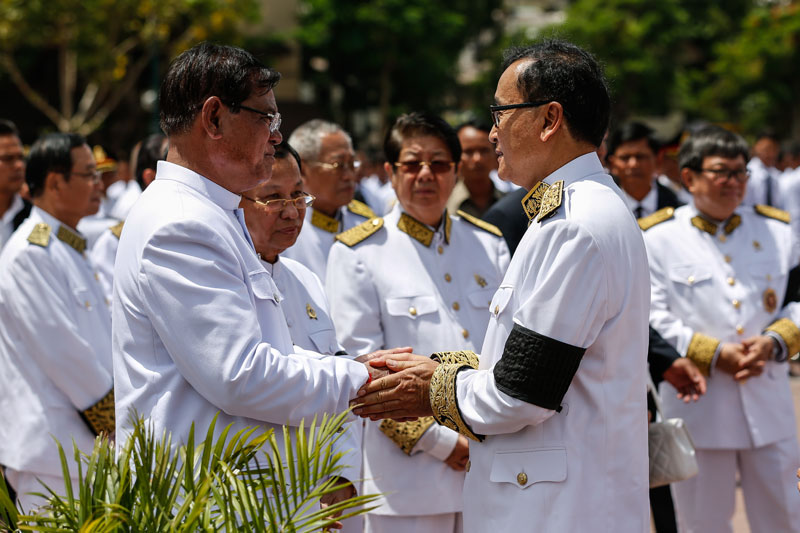Almost 25 years after the CPP was established, the ruling party on Saturday changed its leadership group for the first time, electing Prime Minister Hun Sen as its president and Interior Minister Sar Kheng and Senate President Say Chhum as vice presidents.
After the June 8 death of Chea Sim, a heavyweight of the 1980s communist regime who served as president of the CPP from the time of its creation in 1991, the party called a special congress to elect Mr. Hun Sen, its erstwhile vice president, to the position, and to replace him as the deputy leader.

Mr. Kheng and Mr. Chhum, who is also the CPP’s secretary-general, were granted the elite royal title of “samdech” on June 14 and had both been favorites to take over the vice presidency once Mr. Hun Sen vacated the position.
Yet the ballots handed to the 508 central committee members present on Saturday provided no scope for choice, with a single ticket naming Mr. Hun Sen as president and both Mr. Kheng and Mr. Chhum as vice presidents. Members could only “agree,” “disagree” or “abstain.”
“The congress proceeded directly and secretly to select Hun Sen as president, Sar Kheng as vice president and Say Chhum as vice president,” said a statement released by the CPP after the congress.
On Saturday evening, Information Minister Khieu Kanharith wrote on his personal Facebook page that only one member of the central committee present did not vote to approve the joint ticket of Mr. Hun Sen, Mr. Kheng and Mr. Chhum.
The CPP’s statement also said that Mr. Hun Sen had been reaffirmed as its prime ministerial candidate for the 2018 national election—a move once ordinary for CPP congresses, but which was not made at their last party congress in January.
“[Surrounding] the 38th central committee congress in the CPP’s fifth mandate [of government] on June 20, to select Hun Sen as president and Sar Kheng and Say Chhum as vice presidents, there was a rumor poisoning the public that Hun Sen would not be the prime minister anymore,” the statement said.
“Regarding this issue, the CPP announces that Hun Sen will continue to be the prime minister and to be the prime ministerial candidate for the next term, in compliance with the decision of the mass extraordinary CPP nationwide congress.”
Contacted Sunday, CPP spokesman Sok Eysan said the choice of both Mr. Kheng and Mr. Chhum as vice presidents was offered by the standing committee and approved by the central committee, and that neither would be considered “first vice president.”
“The two vice presidents are both heroes from the party’s standing committee and there is no need to place a ranking, because when we give rankings, one will be higher and one will be lower,” Mr. Eysan said. “Their achievements are equal and they will have individual responsibilities.”
The spokesman added that the decision to place Mr. Hun Sen, Mr. Kheng and Mr. Chhum on one ticket for approval by the CPP congress was not less democratic than allowing the central committee to vote for different candidates.
“We implemented our existing procedures that are stated in the party’s statutes and internal regulations, and our party’s statutes and internal rules are full of democracy, in comparison to the other parties,” he said.
Mr. Eysan also said that the familiar CPP banners and billboards displaying Chea Sim as party president, Mr. Hun Sen as vice president and National Assembly President Heng Samrin as “honorary president” would be phased out and replaced with new banners showing only the faces of Mr. Hun Sen and Mr. Samrin.
“If we put the two vice presidents, it would not look good,” he said. “We put only the top leaders.”



